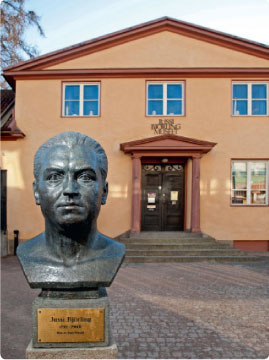Jussi of the Month March 2019
Jussi in Helsinki and London, March 1955
In “Jussi of the Month” January 2019 we followed Jussi Björling to Helsinki and Tampere. But he was then already booked for new appearances at the Opera in Helsinki in March the same year, and then for a cause that was very important for Finnish opera lovers: the building of a new opera house in Helsinki. Opera had been played in Helsinki to and fro since the mid-19th century, but then by visiting opera companies. However, from 1873 the newly started Finnish Opera gave regular performances, until 1879, but then they had to close down the activities due to financial problems. It was revived in 1911 by Edvard Fazer, Oskar Merikanto and Aino Ackté. To begin with it was named the Domestic Opera but from 1914 until 1956 it was the Finnish Opera. The first years they played at the National Theatre, close to the Railway Station, but from 1918 they were located to the old Russian Alexander Theatre.
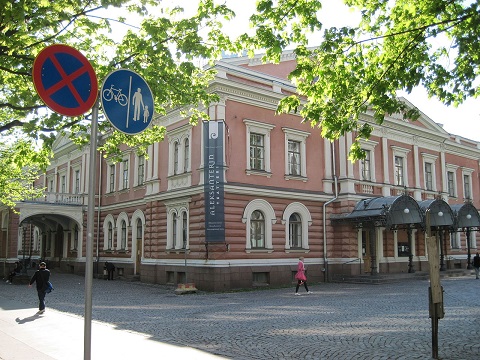
Alexander Theater
In “Jussi of the Month” January 2019 we followed Jussi Björling to Helsinki and Tampere. But he was then already booked for new appearances at the Opera in Helsinki in March the same year, and then for a cause that was very important for Finnish opera lovers: the building of a new opera house in Helsinki. Opera had been played in Helsinki to and fro since the mid-19th century, but then by visiting opera companies. However, from 1873 the newly started Finnish Opera gave regular performances, until 1879, but then they had to close down the activities due to financial problems. It was revived in 1911 by Edvard Fazer, Oskar Merikanto and Aino Ackté. To begin with it was named the Domestic Opera but from 1914 until 1956 it was the Finnish Opera. The first years they played at the National Theatre, close to the Railway Station, but from 1918 they were located to the old Russian Alexander Theatre. Little by little they were feeling limited for space and in the 1950s they started in earnest to plan for the building of the new opera house. The income of the two performances Jussi participated in in March 1955 was intended for the new house. But they had a long and far from straight path to walk before the dream came to fruition. In 1975 an architect competition was announced, but the proposal of the winning trio was revised several times and not until November 1993 the new white opera house on Tölöviken was inaugurated. Until then they had to make do with the Alexander Theatre.
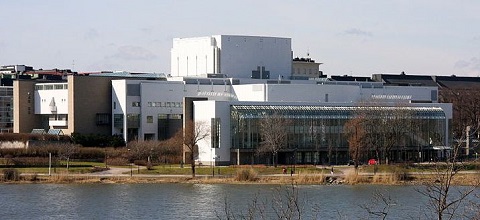
Helsinki opera house opened 1993
The first of Jussi’s two appearances took place on 10 March, and Swedish daily Dagens Nyheter could report that “in spite of drastically increased ticket prices the Finnish Opera was sold out when Jussi Björling sang Cavaradossi in ‘Tosca’. The evening was a gigantic success for Jussi.” The headline of Hufvudstadsbladet’s (the Swedish-language newspaper) review read “Jussi Sang for a New Opera House” and the reviewer – Ehr. – was lyrical: “It is really the height of amiability that one of the greatest of singers sings for the benefit of a new house for the opera of one of the smallest capitals of Europe. One is to begin with proud that Jussi Björling comes to our city at all, with the small, small halls, where the intensity in his peerless voice seems quite astonishing, but the stage milieu is almost on an amateur theatre level. However – that doesn’t diminish the success of the master or the effectiveness of Puccini’s drama that the church procession is only a vague suggestion, that the cantata and the church bells of Rome lack the atmosphere of a larger space and that the execution platoon shuffles forward. – for those perceptive the music can conjure up the needed images and concerning the soloists Cavaradossi and Scarpia, that is Björling and Lahtinen, carry the proceedings with a frenzy in the outbreaks which strongly challenge the culmination of the drama: Tosca’s acting. Elli Pihlaja has during these two performances demonstrated what an exquisite actress she is. Also vocally she was good, albeit her voice isn’t at all made for this role and the powerful orchestra. The performance was very much the same as three weeks ago, so it seems unnecessary to repeat what I said then. One noted again that the celebrated guest doesn’t give a very deep characterisation of his role figure, but imbues the dramatic moments with a violent expressivity in action as well as singing.”
Also the Finnish-language papers, headed by Helsingin Sanomat, praised the performance. Three days later, on 13 March, ‘Rigoletto’ was on the agenda. Ehr. was there again: “There was real vocal splendour at the Finnish Opera in ‘Rigoletto’. The guest was in even better voice it seemed – our climate is unpredictable. And the combination Jussi [Björling] – Sylvelin [Långholm] – Maiju [Kuusoja] – Lauri [Lahtinen] is of a kind that one has to rack one’s brain to remember such glorious sound as in the big quartet in the fourth act. The audience showed their appreciation with applause after every big aria, most of all those of the guest. But that they during ‘La donna è mobile’ burst out in such ovations that the orchestra is inaudible during the third verse and the singing disappears, must be seen as tasteless routine - the superb singer sang many an aria still better than this song, with all his capacity of warmth and brilliance - - - The stage direction at times seemed to have taken time out, and a more commonplace thunderstorm has seldom been seen – and heard, since the grateful wind-howling of the chorus was a mess and the clouds were missing. This scene can produce goose-pimples; why not make it that way?
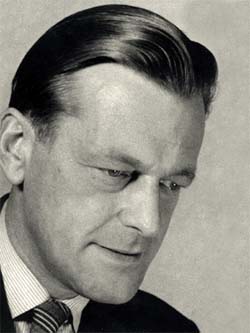
Jussi Jalas
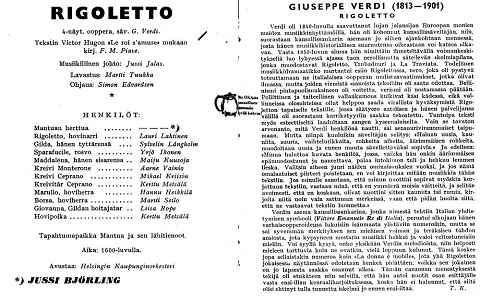
Program for Rigoletto March 1955 in Helsinki
N.-E. E. in Nya Pressen, also Swedish-language, was briefer but just as enthusiastic: ”As expected Jussi Björling was similarly superb as the indecent duke as he had been a few days earlier as the noble martyr in ‘Tosca’. A great, deeply aiming actor he isn’t, but instead so much greater as singer. The way he performed his arias, he enticed – in spite of the fact that the voice occasionally showed signs of cloudiness – his listeners completely, not least with the glorious expansion of his impressive forte fermatas.”
There was also time for a concert before he had to travel back home. On 16 March Hufvudstadsbladen, this time represented by E. B. wrote: Jussi Björling gave yesterday his second concert this spring season in the B-Exhibition Hall. When he entered the beautifully flower decorated stage one heard ‘too many flowers here’ – at least where he was used to standing in front of the grand. But quickly Court Singer Jussi and Conductor Jussi jointly ‘picked flowers’. A flowerless spot for the Court Singer was prepared. The concert could begin.
The enthusiasm of the audience grew throughout the evening and reached deafening levels when it was at the boiling point. Arias by Tchaikovsky, Puccini and Giordano, Lieder by Wolf, Brahms and Schubert, a couple of Sibelius numbers, Söderman’s touching Kung Heimer och Aslög, and less weighty things by Rachmaninov, Oley Speaks and Louis Campbell-Tiptov were served. The warm, infinitely beautiful voice and the unaffected simplicity of the performances enchanted the listeners. The seamless legato singing, the technical control, the breath-control evoked admiration. The voice could adopt a Nordic light tone as in Söderman’s Kung Heimer, glowing splendour and brilliance as in the arias from ‘La Bohème’ and ‘Andrea Chenier’. The much-acclaimed Court Singer was discreetly accompanied by Jussi Jalas.”
Back to Stockholm he then travelled, but only for a stopover and change of underwear, since Royal Albert Hall in London was waiting for him. He could however enjoy a Royal sleep at prestigious Savoy Hotel, before going to Kensington, where the circle-shaped dome-adorned building majestically ascends above the surroundings. Since 1871 it has been the scene for great events, best-known today presumably for the Proms concerts held every summer since the 1890s. As usual when Jussi appeared in Britain and thereabouts he had Ivor Newton at the Grand piano, and as was his habit he had put together a not too extensive programme which he generously filled out with encores. At the Jussi Björling Museum there is a programme preserved, where some conscientious visitor to the concert had added all the extras in the places where they were performed during the concert – sometimes with comments. For instance he stresses that Oley Speaks’ Sylvia was sung in English and that the Grieg songs were performed in Norwegian. The well-known Because was one of the last numbers, and there he has added (Why?). In The Times and Daily Telegraph there were short paragraphs and Telegraph talked about “singing of noble quality” but also mentioned that the size of the hall tended to diminish the effect of some of his top notes.
Click here to listen to Sylvia from 1952
The size of the hall was also something Pandora in Svenska Dagbladet had focused on:
“Bigger than you ever think is Royal Albert Hall – o, Jussi, Jussi little!* That was what I thought in consternation when I got in. I tried to understand what it would feel like to stand on the podium, like a little dot under such an enormous dome. Faces in front, behind, below and above, in breathless eternity. We were many thousands waiting for him and his voice had to reach, in softest pianissimo also those in the uppermost gallery – higher than I could have believed. The orchestra seats is enormous; that’s the bottom of the cauldron. Then comes twelve row of stalls, then three floors of boxes, then another twelve steep rows again, and lastly the gallery. I contracted nervous, patriotic palpitation – there is certainly an ‘embarras de richesse’ in English music life, and one imagines that the audiences are critical. And one wants so dearly that everything Swedish shall hold one’s own in the competition – when one is expatriate Swede.
It was a success – and what success! I soon ceased feeling sorry for Jussi, and became envious instead. How nice it must be when people never will stop clapping, when they shout and stamp! He shone like a sun, and behind me I heard a typical English understatement: He seems to be in a good mood. Myself I was moved, grateful, proud and happy – and idiotically sentimental when he sang a Sibelius song in Swedish. For the greater part of the audience the two Puccini arias of the programme were of course highlights of even more accessible kind – but the critics both apprehended and appreciated the Scandinavian lyricism in the short reviews the following day. Jussi was generous with encores throughout the programme; they were well-judged between light and serious, and everything he sang so that everyone in the gigantic hall were spellbound. He also behaved well; when he was given a big box of chocolate instead of flowers he was careful to let everyone see how beautiful it was and how happy he was, and one of the encores – Because you came to me – he sang with his back towards the stalls turned towards those behind the podium. A murmur of delight was heard all through the hall when he in the midst of ‘La donna è mobile’ started acting.
They didn’t want him to stop singing but also that delicate art he could handle by friendlily but decisively closing the lid of the grand. Thank you, Mr Björling! It was a pleasure to be Swedish last night.
PS. Just when I was going to post this I met the handyman of the block, Brandon, with the fine programme in his hand; he had fished it up from the wastepaper basket to bring home to Mrs Brandon. He smiled a broad toothless smile and slapped the glossy picture of Jussi on the cover. ‘He’s a good chap this one, isn’t he, Madam. Gosh I could listen to him all night’. Brandon had been in the gallery! – and it was the third time he heard Jussi Björling. Nu he just wanted to know how his name was pronounced, to be able to outdo all the others on the block.”
Click here to listen to Because from 1955 in a concert in New Orleans
Göran Forsling
* This line is a travesty of a Swedish song, very well-known and popular in the 1950s




